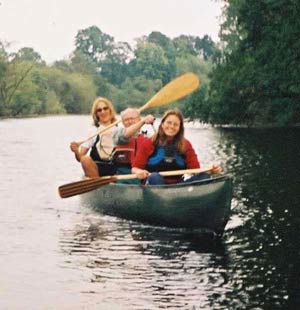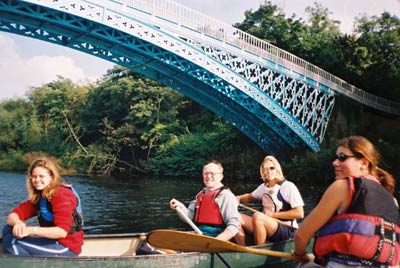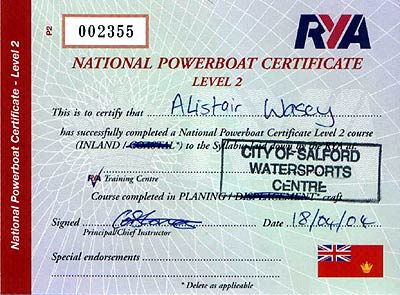Spring
Over the past few weeks spring
has stealthily arrived here in England. It doesn't take a practiced
eye to spot it's advance: from every tree and bush has sprung
a too-green beard of fresh growth; while birds have taken every
available spot for nest building. In the meantime I have begun
the summer-long task of removing enormous bees from my window
and it appears that the frogs have been having a wonderful time
in the garden pond.
To the discerning connoiseur of Britain's fickle
seasons, between summer's vanguard and winter's frosty rearguard,
spring may be discerned in more subtle ways. Epoxy has returned
to it's liquid state, and Kirstin, my rowing double partner
has been appearing at the boathouse wearing progressively fewer
layers. More importantly, the fair weather canoeing season has
opened!
"Lord" Brian is a nutter, and one of
the nicest blokes I will ever meet. Standing far below my shoulder
height, with legs weakened by childhood illness making walking
difficult for him, this small wiry, but engaging man, the same
age as my Father has weathered the Winter by simple expedient
of finding fast-flowing white water and scaring himself half
to death in a canoe on it. Brian will emerge grinning and laughing
from a thorough dunking that leaves men a third his age white
faced. The man is a legend.
Fortunately, we were able to encourage Brian to
forgo these dangerous pleasures in favour of what was intended
as a more stately and altogether more relaxing day on the river
- a twelve mile cruise down river over a couple of knots of
current through the Duke of Westminster's estate into the historic
town of Chester, which dates back to the time of the Romans.
However, the local wildlife had opinions about our gentle pursuits!

All began well as we cruised quickly, but with
little effort, as a strong flow from Wales pushed us down river.
From open fields we ghosted past banks bedecked by the human
detritus of a waterside life: summer houses in various states
of disrepair with an occasional gleaming example inviting our
closer attentions. We rounded a corner past the last of these
dwellings to be met by a large and bad tempered swan. Swans
in this country are a sacred beast and, through laws of old,
belong to the Queen. They are phenomenal birds, with a wing
span of six feet, and with more than adequate power to break
a human arm. One is always somewhat in awe of these birds, especially
when meeting them on their own territory as it were.
Most swans may be dealt with fairly easily. One
paddles quickly and quietly past them, giving them as much room
as is practical, and once away from their nest, you are left
alone. This swan however, was a loner and had Attitude. We were
treated to a spectacular display of a Swan In A Bad Mood. We
realised later that it's neck was severely distorted, as if
at some time it had been broken and had set badly. One is always
respectful of an injured wild animal.
After a couple of miles of constant attention
from this swan, we sought refuge on the bank hoping that in
the time it took us to have a barbeque it would lose interest.
We noticed some heifers far away at the other side of the field,
but as none of us fancied another run-in with the swan, decided
to risk it.. "Watch out, they'll come and play with us
soon" joked Richard. How right he was. With the canoes
arranged around us and the sausages cooking nicely we soon became
the centre of attention for a ring of Heifers, and one bull.
This presented a problem as a few tens of tons of interested
Beef could do rather a lot of damage to a ton of humans and
their gear. The cows shortly became insufferable and in the
best traditions of our Maritime isle we beat a hasty retreat
to the water. Better the Swan you know, than the Bull you don't
know!

Drifting down the river, attended on the bank
by our friends the Heifers, and escorted at a distance by our
friend the swan, we consumed what could be salvagedof the sausages,
munched a cookie or two, and set our faces for a long and somewhat
hungry paddle to the one secure barbeque site we could be sure
of. The swan soon left us alone, and although we passed two
other breeding pairs, there was an implicit truce declared.
The Barbeque was superb, and as we huddled around
it against a keen April wind we were glad of our many layers
of clothing and resolved to purchase a windbreak at the earliest
opportunity. It certainly went to show that the unexpected can
always be guaranteed to happen and we were fortunate indeed
to have a member of the trip who had some experience in dealing
with animals, without him, we might have been in a far worse
situation. An advance party of three of completed the journey
in fine style paddling the final three miles as fast as we could,
to arrange cars and trailers to receive the stragglers. I had
the bow seat and it was sheer pleasure to hear the bow wave
creaming just beyond my ankles, and some of the finest English
countryside passing on either side.
Now, after last month's railing against powerboats,
when the opportunity to get a qualification in Powerboat driving
dropped in my lap, I jumped at it. For a nod and a wink less
than one hundred of my English Pounds Sterling I was able to
have two days instruction at Salford Quays in Manchester. Salford
Quays is a place I feel very reflective of our very English
eccentricity. Manchester is something like 30 miles in land
from the coast yet for many years one of England's greatest
ports. Interestingly, the port and the canal connecting it with
the coast is still in regular, if sparse use. From my desk at
work I am used to seeing an unending procession of cargo ships
bringing grain to a local mill.
The legacy of this is an intriguing waterscape
in an inner-city setting. There are a number of basins of varying
sizes connected by small canals. Until relatively recently,
these areas were run down, the water polluted and dead, but
a rescue attempt for the area has been tremendously successful
and makes this an interesting and pleasant place to visit. Of
course, it was tricky to take too much of this in while driving
at 30mph along a tiny lake no more than 500 metres long, coping
with the wake thrown up by other launches in the combined space,
but I appreciated it later.
The course was devised by the Royal Yachting Association
and provides an internationally recognised standard of competence.
It was primarily a practical course, although theoretical aspects
covered basic boat maintenance, essential gear, clothing and
safety items, basic navigation, weather interpretation among
other areas. The practical aspects of the course dealt with
manouvers such as coming alongside, approaching a buoy, high
speed manouvering, and most importantly, man overboard drill.
The course was worth doing for this one exercise which is infinitely
transferrable to any form of water based transport.
What I liked about this course was that it wasn't
overly technical - it was rather like learning to drive a car:
a skill that may reasonably be gained by almost anyone, but
it did tell you the fundamentals - how to be safe, how to handle
your vehicle, and what to do when things go wrong. No matter
what your level of competence I would advise anyone to do one
of these courses - it went over many things I was aware of,
but there were some things I wouldn't have thought of without
it. Man overboard for example - the importance of pushing that
prop hard over away from the person in the water just wouldn't
have occured to me. The ability to practice skills in a controlled
environment was also very important to me.
All in all, money very well spent, and an internationally
recognised qualification gained. Of course, it also means that
I can drive the rowing club launches which radically increases
my opportunities to yell at people!

Easter Monday was the occasion of
Northwich Head. As you may remember from my last
column, Chester Head was an unmitigated (and painful)
disaster, so I approached this race with a certain trepidation.
Kirstin and I were rowing a double (two people, two oars each)
in a men's event, so we were out for a pleasent row, rather
than to win it (which was just as well). As usual at these events,
the wait for the start of the race was protracted (over an hour)
although this did allow time for a chat with the opposition.
We achieved the 2300m in 10 minutes and 7 seconds, losing by
48 seconds to an all-male crew from Chester. Not a record breaker,
but pleasent exercise on a pleasent day.

Kirstin and I rowing a double
While on the subject of rowing, after last month's
article, David Romasco of Kent
Island Boat Works emailed me, tongue-in-cheek:
"I think you've not got the right perspective on this;
seems to me, after reading your account of chilling accident
after accident with rowing shells that we (the rest of the boating
public) should in fact be impelled to upgrade our horsepower
and speed so as to avoid these hurtling needles of doom."
I posed a question about a "highway code"
for the waterways. I've found them in the form of International
Regulations for Preventing Collisions at Sea often referred
to as the Colregs
(as I am informed). I wonder whether it would be possible to
write an abridged version for inland waterways in a more accessible
form - preferably one that even we oarsmen can read and understand!
Next month - the trials and tribulations of organising
a regatta for 11 to 18 year olds! May 12th, wish me luck!
Take Care
Alistair
Wasey

